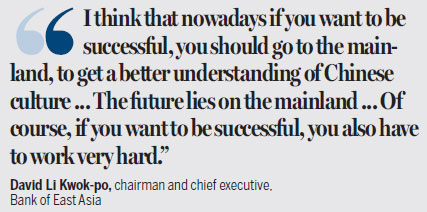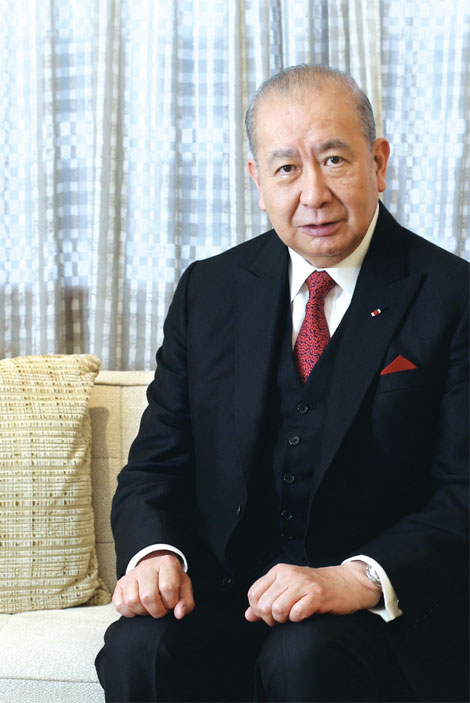'Go north, young man'
Updated: 2015-07-06 06:54
By Sophie He(HK Edition)
|
|||||||||
The mainland is where the future is, BEA boss David Li Kwok-po tells youngsters wishing to making it big in the business world. Sophie He reports.
'The future lies on the mainland," declares David Li Kwok-po. And he has one piece of advice for ambitious young Hong Kong people seeking business opportunities: "Go to the mainland."
The chairman and chief executive of the Bank of East Asia Ltd (BEA) has been in the business for close to half a century, having joined the lender in 1969 and becoming chief executive in 1981. There have been a lot of major changes in the Hong Kong banking industry over the past decades, the 76-year-old said.
|
Bank of East Asia prides itself on being a first-mover on the Chinese mainland, where the first branch was set up in Shanghai as far back as 1920, says Chairman and Chief Executive David Li Kwok-po. Roy Liu / China Daily |

In the 1960s and 1970s, a lot of foreign banks tried to come to Hong Kong and acquire local lenders, while since the 1990s, we see that banks from the Chinese mainland have become very aggressive in acquiring lenders in the SAR, Li pointed out to China Daily in an exclusive interview.
"In recent years, the banking industry in Hong Kong has become even more competitive, as there are so many big players now in the market," Li said, adding that there are very few independent local banks left.
"In fact you can count them in one hand, while in the 60s and 70s there were at least a dozen of them."
On the home front
Li believes the next five years will see fewer independent local banks left, as tight regulatory constraints are making it less easy for local banks to be profitable.
The key to BEA's success as an independent local bank is that it is deeply rooted on the mainland, noted Li, whose grandfather, Li Koon-chun, co-founded the lender in 1918.
"We are very lucky that BEA started mainland operations very early, since the 1920s," David Li said.
The first mainland branch was set up in Shanghai, in 1920. "Although for a period of time our operations were frozen, the bank continued to expand on the mainland from the 1980s onwards, and we now have 128 branches and sub-branches on the mainland."
BEA's objective is to continue to expand on the mainland and to consolidate its bases there, said David Li. "Because it is where our home is."
David Li thinks what makes BEA stand out on the mainland is its corporate culture.
BEA encourages local employees to take the lead and therefore they are much closer to local communities than foreign banks, who may like to bring in their own people, he explained.
David Li also pointed out that BEA is going more "digital" now. As smartphone penetration is very high on the mainland, the lender is focusing on developing "Internet banking" services and encouraging customers in second- and third-tier cities to bank via their smartphones.
BEA also recently teamed up with privately owned lender WeBank Co Ltd to expand its Internet financing businesses.
Founding shareholders of WeBank are Tencent Holdings, Baiyeyuan Investment and Liye Group.
Change with the times
David Li noted that mainland economic growth has slowed and the trend is expected to continue for the next two years, adding that BEA will use this period of time to train staff to provide better services.
Aside from the mainland, BEA will continue to expand in Hong Kong, said David Li.
"We will continue to expand our customer base in Hong Kong. We will also develop Internet banking as well as mobile banking here," he said.
David Li said his own business philosophy is to bring in as many people as possible, and always try to motivate staff to do a better job.
"I always encourage teamwork. I also believe that when people have done the right things, we should give both praise and credit."
David Li suggested that ambitious Hong Kong youngsters should "go to the mainland" for business opportunities.
"I think that nowadays if you want to be successful, you should go to the mainland, to get a better understanding of Chinese culture," he said. "The future lies on the mainland."
People on the mainland thrive on relationships, and they rely on building long-lasting relationships even in business, he noted.
And young people of Hong Kong need to understand that if they want to be successful, they need to understand the "mainland way of thinking", which could be different from the way of thinking in Hong Kong, David Li advised.
"Of course, if you want to be successful you also have to work very hard, you have to be creative, you have to be persuasive - to be able to get ahead of others while respecting their points of view."
But despite the great opportunities emerging on the mainland, Hong Kong is still a great place to do business as it has the rule of law, which is crucial for any kind of business, David Li emphasized.
Contact the writer at sophiehe@chinadailyhk.com
(HK Edition 07/06/2015 page7)
